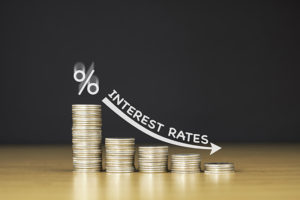FTSE 100 - how to invest in British companies [Guide]
The FTSE 100 index stands for Financial Times Stock Exchange 100 Index. The diminutive "Footsie" is also used frequently. The FTSE 100 is an index that represents the largest and most liquid companies listed on the London Stock Exchange (LSE - London Stock Exchange). The index is calculated by FTSE Russell, which is part of the London Stock Exchange Group. In the last 5 years, the index increased by 26,2%, which gives the average annual rate of return at the level of 4,8%. This result is much weaker than the FTSE 250 (medium-sized companies), which achieved a rate of return of 2016% between January 2020 and December 34,1.
The origins of the FTSE 100 index go back to 1984, when the index began to be quoted. Initially, the authors of the index were the Financial Times and the LSE, which established a Joint Venture for this purpose. The index replaced the FT30 index, which was the benchmark for many investors between 1935 and 1984.
It is worth mentioning that the FT30 index is the oldest, continuously operating index of the British market. The beginnings of the FT Ordinary Index date back to 1935. Then Otto Clarke and Maurice Green started calculating it. The index was published in the Financial News and after 1945 by the Financial Times. The company that has been included in the index continuously since 1935 is Tate & Lyne (it produces, among others, sweeteners and stabilizers for the food industry).
How are index shares calculated?
The FTSE 100 index is calculated according to "Free-float capitalization". This means that the components of the UK index are derived from market capitalization, multiplied by the percentage of free float shares.
Although the calculation method seems complicated, it is relatively simple. Once a company's capitalization has been determined, it is necessary to calculate the ratio of free-float shares. To do this, you divide the number of free float shares with the total number of shares. For example, a company has 1 shares worth £ 000, its capitalization is £ 000 million. If only 100% of the shares (100) are in free float, then "Float-adjusted market cap" is £ 50 million.
Reclassification in the index
The composition of the index is updated every quarter. Homeserve left the FTSE 2020 index in December 100. Pershing Square Holdings took its place. All December changes took place on Friday 18 December. As a result, the first day of listing of the index with the new composition took place on Monday, December 21, 2020.
Below is a summary of changes in the composition of the index over the past year:
| Company name | Included in the index | Previous index | Quarter |
| Homeserve | 250 FTSE | 100 FTSE | Q2020 XNUMX |
| Pershing Square Holdings | 100 FTSE | 250 FTSE | Q2020 XNUMX |
| B&M European Value Retail | 100 FTSE | 250 FTSE | Q2020 XNUMX |
| ITV | 250 FTSE | 100 FTSE | Q2020 XNUMX |
| Avast | 100 FTSE | 250 FTSE | Q2020 XNUMX |
| GVC Holdings | 100 FTSE | 250 FTSE | Q2020 XNUMX |
| Homeserve | 100 FTSE | 250 FTSE | Q2020 XNUMX |
| Kingfisher | 100 FTSE | 250 FTSE | Q2020 XNUMX |
| Carnival | 250 FTSE | 100 FTSE | Q2020 XNUMX |
| Easyjet | 250 FTSE | 100 FTSE | Q2020 XNUMX |
| Centrica | 250 FTSE | 100 FTSE | Q2020 XNUMX |
| meggitt | 250 FTSE | 100 FTSE | Q2020 XNUMX |
| Fresnillo | 100 FTSE | 250 FTSE | IQ 2020 |
| Intermediate Capital Group | 100 FTSE | 250 FTSE | IQ 2020 |
| Pennon Group | 100 FTSE | 250 FTSE | IQ 2020 |
| Kingfisher | 250 FTSE | 100 FTSE | IQ 2020 |
| NMC Health | 250 FTSE | 100 FTSE | IQ 2020 |
| TUI AG | 250 FTSE | 100 FTSE | IQ 2020 |
Source: own study based on the Quarterly Review published on ftserussell.com
FTSE 100 Futures
The FTSE 100 is the most popular index in the UK market. It is therefore no surprise that the index is the underlying instrument for futures contracts. The futures contract is quoted in British pounds.
The multiplier for the contract is £ 10. This, at 6 points, gives the contract face value of £ 700.
The minimum chart change is 0,5 points or £ 5. Futures contracts expire every third Friday of March, June, September and December.
Options on the FTSE 100
It is also possible to trade options on the FTSE 100 index. The contract size is the same as the futures contract. The options have a European style of execution (only exercised at the end of the contract). There is a wide variety of options on the market. From quarterly (March, June, September, December), for the next two years and the next 3 months (monthly options). It should be remembered that for the call option, the month indication runs from A (January) to L (December). For put options, the months run from M (January) to X (December).
Index composition
The companies included in the FTSE 100 index are classified according to the sectors described by Industry Classification Benchmark (ICB). ICB is developed by Dow Jones and FTSE and is a competitive solution for GICS classification (Global Industry Classification Standards) created by MSCI (former Morgan Staley Capital International) and S&P.
ICB is divided into 11 industries, which are divided into 20 "Super Sectors", these in turn, into 45 Sectors and 173 sub-sectors. As of December 31.12.2020, 100, the FTSE 18 had representatives from XNUMX "super sectors". Looking at the composition of the index, it can be concluded that companies from the old economy dominate. The six largest "super sectors" are:
- Personal & Household Gods - 15,3%
- Health Care - 10,4%
- Industrial Goods & Services - 9,9%
- Basic Resources - 9,9%
- Oil & Gas - 8,7%
- Banks - 8,6%
The capitalization of companies included in the index was £ 2020 billion at the end of 1. The median capitalization was £ 720 billion. It is worth mentioning that the index is very concentrated. The top 8,55 components of the FTSE 10 index had a 100% capitalization of the index. The largest companies included in the index were:
- Unilever - 6,5%
- AstraZeneca - 5,6%
- HSBC Holdings - 4,5%
- GlaxoSmithKline - 3,8%
- Diageo - 3,8%
The 6 selected companies from the FTSE 100 index will be briefly described below.
Auto Trader Group
The company was established in 1977. It is the largest car classifieds website in the UK. Auto Trader Group owns a website where you can buy a new or old car. On the website you can also take advantage of the car loan offer or car insurance. According to the company's data, the average monthly number of visits to the website was approximately 50,8 million. The company reports that 478 cars are available for purchase on its website. At the end of the financial year 000, Auto Trader Group employed 2020 people.
| Auto Trader plc | 2018FY | 2019FY | 2020FY |
| revenues | 330,1 million GBP | 355,1 million GBP | 336,9 million GBP |
| Operational profit | 220,6 million GBP | 242,8 million GBP | 255,7 million GBP |
| Operating margin | 66,8% | 68,4% | 75,9% |
| Net profit | 171,3 million GBP | 197,7 million GBP | 205,1 million GBP |
Unilever
Unilever is one of the largest companies in its segment in the world. The company mainly sells food, personal care and cleaning products. They have over 400 brands. Many of them are globally recognizable. It is enough to mention Lipton teas, Knorr spices, Dove soaps, Hellmann's or Domestos mayonnaise. The company operates in over 190 countries around the world. The company's shares are listed on the London, Amsterdam and New York Stock Exchange.
| Unilever | 2017 | 2018 | 2019 |
| revenues | € 53 million | € 50 million | € 51 million |
| Operational profit | € 8 million | € 12 million | € 8 million |
| Operating margin | 16,7% | 24,8% | 16,8% |
| Net profit | € 6 million | € 9 million | € 6 million |
Experian
Experian is a company with over 125 years of tradition. It is one of the global leaders in providing credit reports about consumers and companies. Thanks to its offer, the company reduces information asymmetries regarding, among others the financial situation of the entity. The company generates most of its revenues from B2B activities. The company provides, among others customer credit history and supports decision-making processes with analytical software. Experian operates in over 100 countries and employs 17 people.
| Experian | 2018FY | 2019FY | 2020FY |
| revenues | $ 4 million | $ 4 million | $ 5 million |
| Operational profit | $ 1 million | $ 1 million | $ 1 million |
| Operating margin | 25,0% | 23,8% | 22,8% |
| Net profit | $ 815 million | $ 695 million | $ 675 million |
London Stock Exchange
The LSE group has two branches of activity, the main one is related to being the operator of the London Stock Exchange, the other part of revenues comes from the data segment. The subsidiary is the FTSE Group, which belongs to the big three index providers. After starting the takeover procedure of Refinitiv (financial data provider) for 27 billion pounds, the European regulator was forced to sell Bors Italiana. The company agreed to buy Euronext for € 4,6bn. Interestingly, the London Stock Exchange Group acquired the operator of the Italian stock exchange in 2007 for € 1,6 billion. LSE still has majority packages, incl. in the MTF Turquoise platform or in LCH (Clearing House).
| London Stock Exchange | 2017 | 2018 | 2019 |
| revenues | GBP 1 million | GBP 2 million | GBP 2 million |
| Operational profit | 668 million GBP | 780 million GBP | 893 million GBP |
| Operating margin | 34,6% | 36,6% | 38,6% |
| Net profit | 505 million GBP | 480 million GBP | 417 million GBP |
Reckitt Benckiser Group
The company was established in 1999 as a result of the merger of the British corporation Reckitt & Colman with the Dutch company Benckiser NV As a result, the Reckitt Benckiser Group was established. The company has a wide portfolio of products from the protection and hygiene segment, which is known to the average consumer. The company has, among others AirWick and Calgon air fresheners. One of the company's most famous products is Vanish cleaning agents. The Durex brand, which was acquired in 2010, cannot be forgotten either. It is also worth mentioning that Reckitt also has Finish and Scholl brands in its portfolio. Broad product diversification is the strength of the Reckitt Benckiser Group.
| Reckitt Benckiser Group | 2017 | 2018 | 2019 |
| revenues | GBP 11 million | GBP 12 million | GBP 12 million |
| Operational profit | GBP 2 million | GBP 3 million | GBP 3 million |
| Operating margin | 25,7% | 26,0% | 25,6% |
| Net profit | GBP 6 million | GBP 2 million | -£ 3 million |
Diageo
Diageo it is one of the largest producers of alcohol in the world. The company sells, among others whiskey, rum, gin, tequila or beer. Among the most famous brands are Johnnie Walker, Smirnoff, Guinness and Captain Morgan whiskey. The company also has a minority stake in Moët & Chandon.
| Diageo | 2018FY | 2019FY | 2020FY |
| revenues | GBP 12 million | GBP 12 million | GBP 11 million |
| Operational profit | GBP 3 million | £ 4 million | GBP 2 million |
| Operating margin | 30,3% | 31,4% | 18,2% |
| Net profit | GBP 3 million | GBP 3 million | GBP 1 million |
What could affect the FTSE 100?
The condition of the British and world economy
The index includes both companies operating mainly on the British market (Auto Trade Group, Rightmove) and international corporations whose products are sold mainly on foreign markets (Unilever, Reckitt Benckiser Group, Royal Dutch Shell). For this reason, the index is influenced both by the condition of the world economy (for the most part), but some companies are more exposed to the domestic condition of the economy.
Financial results of companies
In the long term, the company's improving financial results are the most important. Increasing revenues, profits and free cash flow (FCF) are solid arguments for long-term increases in stock prices. For this reason, it is worth following the financial results of companies included in the index. Especially those that have the greatest impact on changing the index value.
How You Can Trade the FTSE 100 Index
One of the easiest ways to invest in the FTSE 100 index is to buy a futures contract. However, due to the sizable face value (1 point is worth £ 10), many investors are forced to look for an alternative with a lower entry threshold. One of them is ETF with exposure to companies from the FTSE 100 index iShares Core FTSE 100 UCITS ETF. As of January 20, 2021, the ETF's assets were in excess of £ 9 billion. TER (total expense ratio) is only 0,07% per annum.
Another option is to take advantage of the index CFD offer.
CFDs on the FTSE 100
Investors can also speculate on the price of the FTSE 100 index on brokerage platforms by buying and selling CFDs (for price difference) in real time. CFDs offer traders a leverage which allows you to engage only a fraction (usually 5% / leverage 1:20 for this instrument) of the margin required. The FTSE 100 is usually found under the symbol UK100.
Popular brokers offering FTSE 100
Below is a list of the most popular ones Forex brokers offering the best conditions for CFDs on US indices.
| Broker |  |
 |
|
| End | Poland | Cyprus / Australia / Mauritius | Great Britain, Cyprus |
| FTSE 100 symbol | UK100 | UK100 | UK100 |
| Min. Deposit | PLN 0 (recommended min. PLN 2000 or USD 500, EUR) |
200 USD | PLN 100 |
| Min. Lot value | price * £ 10 | price * £ 1 | price * £ 1 |
| Commission | - | - | - |
| Platform | xStation | MT4 / MT5 / cTrader | MT4, MT5 |
CFDs are complex instruments and come with a high risk of losing money rapidly due to leverage. From 72% to 89% of retail investor accounts record monetary losses as a result of trading CFDs. Think about whether you understand how CFDs work and whether you can afford the high risk of losing your money.






















![Forex Club – Tax 9 – Settle tax on a foreign broker [Download the Application] Forex Club - Tax 9](https://forexclub.pl/wp-content/uploads/2024/02/Forex-Club-Podatek-9-184x120.jpg?v=1709046278)
![Trading View platform – solutions tailored to the needs of traders [Review] trading view review](https://forexclub.pl/wp-content/uploads/2024/03/trading-view-recenzja-184x120.jpg?v=1709558918)
![How to connect your FP Markets account to the Trading View platform [Guide] fp markets trading view](https://forexclub.pl/wp-content/uploads/2024/02/fp-markets-trading-view-184x120.jpg?v=1708677291)
![How to invest in ChatGPT and AI? Stocks and ETFs [Guide] how to invest in chatgpt and artificial intelligence](https://forexclub.pl/wp-content/uploads/2023/02/jak-inwestowac-w-chatgpt-i-sztuczna-inteligencje-184x120.jpg?v=1676364263)


![WeWork – the anatomy of the collapse of a company valued at $47 billion [WeWork, part II] wework bankruptcy story](https://forexclub.pl/wp-content/uploads/2024/04/wework-bankructwo-historia-184x120.jpg?v=1711729561)
![Adam Neumann – the man who screwed up Softbank [WeWork, part AND] adam neumann wework](https://forexclub.pl/wp-content/uploads/2024/04/adam-neumann-wework-184x120.jpg?v=1711728724)





![How to transfer shares to another brokerage office [Procedure description] how to transfer shares to another brokerage house](https://forexclub.pl/wp-content/uploads/2024/03/jak-przeniesc-akcje-do-innego-biura-maklerskiego-184x120.jpg?v=1709556924)

![The most common mistakes of a beginner trader - Mr Yogi [VIDEO] Scalping - The most common mistakes of a beginner trader - VIDEO](https://forexclub.pl/wp-content/uploads/2024/03/Scalping-Najczestsze-bledy-poczatkujacego-tradera-VIDEO-184x120.jpg?v=1711601376)
![Learning patience: No position is also a position - Mr Yogi [VIDEO] Scalping - Learning patience - No position is also a position - VIDEO](https://forexclub.pl/wp-content/uploads/2024/03/Scalping-Nauka-cierpliwosci-Brak-pozycji-to-tez-pozycja-VIDEO-184x120.jpg?v=1710999249)
![When to exit a position and how to minimize losses - Mr Yogi [VIDEO] Scalping - When to exit a position and how to minimize losses - VIDEO](https://forexclub.pl/wp-content/uploads/2024/03/Scalping-Kiedy-wyjsc-z-pozycji-i-jak-minimalizowac-straty-VIDEO-184x120.jpg?v=1710336731)



![FTSE 100 - how to invest in British companies [Guide] ftse 100 index how to invest](https://forexclub.pl/wp-content/uploads/2021/01/indeks-ftse-100-jak-inwestowac.jpg?v=1611308664)



![FTSE 100 - how to invest in British companies [Guide] footprint chart. jpg](https://forexclub.pl/wp-content/uploads/2021/01/wykresy-footprint-chart.-jpg-102x65.jpg?v=1611237816)
![FTSE 100 - how to invest in British companies [Guide] investments and geopolitics 2021 webinar](https://forexclub.pl/wp-content/uploads/2021/01/inwestycje-i-geopolityka-2021-webinar-102x65.jpg?v=1610539376)










Leave a Response